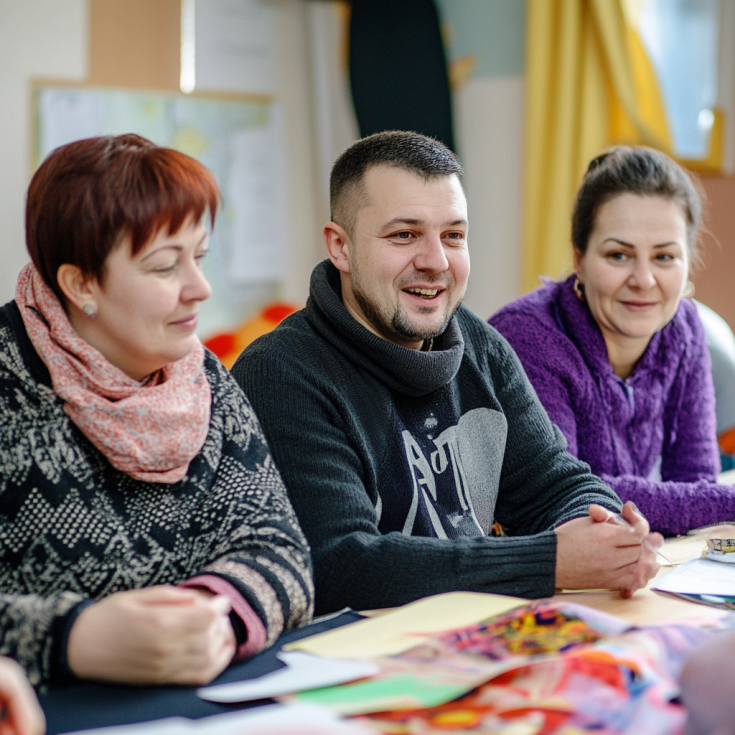Inspiring support services for migrants’ self-employment

It comes as no surprise to the reader that conflicts near and far tend to mean new migration flows to Europe. The latest inflow of migrants from Ukraine is just one in a long list of tragic cases and will likely not be the last. While providing a haven for people escaping a dire situation is following European and humanitarian values, and international law for that matter, it is also clear that it adds pressure to the local social welfare systems. Therefore, governments on all levels are looking for means to equip newcomers with the necessary knowledge and skills to become self-reliable as soon as possible.
Self-reliability often equals financial independence. Therefore, many integration programmes focus on employability and employment. However, this can sometimes be tricky because the European labour market often requires certain language standards or other certificates of competence that people outside the EU do not possess. Yet this does not mean that the newcomer does not have the relevant skills and experience to earn a living; they have administrative barriers to secure employment.
A way to work around it and tap into the “hidden potential” of migrants, is to give them the tools to become self-employed entrepreneurs. This way, the migrants can start earning income and become assets for the economic development of a region. But for this transition to succeed, systemic guidance and encouragement that takes into account both the needs of migrants as well as the realities of starting a business are required for these individuals to get their footing in a new setting. Luckily, Interreg Europe has a project directly tackling this matter.
MILEstone project – migrant’s integration at its core
“Migrants‘ Integration in Local Economies” or MILEStone is an ongoing Interreg Europe project that addresses the sustainable labour market inclusion of non-EU nationals. It includes partners from areas that have been destinations for migrants for decades, as well as from areas which have become arrival regions in recent years, therefore creating ample space for knowledge exchange. The rationale of the project is to identify and take additional measures to promote vocational training (lifelong learning) as well as business creation by non-EU nationals as these individuals often remain in low-income jobs where they cannot exploit their full skillset.
Inspiring good practices for increasing the target group’s self-resilience
The project has already identified several good practices across the partnering regions. They serve as valuable examples for other regions tackling the challenge of integrating non-EU nationals into the labour market.
Through targeted activities, such as weekly StartUp cafés in areas with migrant communities, free workshops, and personalised guidance, the programme supports aspiring migrant entrepreneurs and addresses the socio-economic challenges in the region. The innovative character of StartUp Time is highlighted by its emphasis on a systematic and professional support structure, inclusivity, knowledge transferability, and providing an informal environment for migrants to discuss business ideas with multilingual business advisors.
In Startup Time, the migrant entrepreneur gains greater trust in the support system, authorities and residents as well as a better understanding of local (business) culture, which contributes to a greater sense of belonging. The programme is a collaboration between the non-profit business guidance organisation Nyföretagarcentrum and Linköping municipality, with funding from both the municipality and private partners.
Discover more about the 'StartUp Time' good practice.
In the context of the war between Ukraine and Russia, the Finnish Employment Services have seen a surge in the number of unemployed job seekers. Considering challenges related to securing employment and a general interest in entrepreneurship among the target group, the City of Jyväskylä’s Expertise Centre for Immigrants came up with a series of concise info sessions on starting and running a business for budding entrepreneurs residing in the region.
The trainings take place once a week for two hours over one month and focus on the basics:
- How to set up a company in the new country
- How to use public grants to support the company
- How to manage finances and taxes, etc.
Such trainings can be very effective, especially among target groups that used to be entrepreneurs in their own country before they were forced to leave. They already possess basic knowledge about business models, sales, and product or service design, but they lack knowledge of the local customs and regulations. Therefore, the programme serves as an encouragement and aids lowering the threshold for venturing into entrepreneurship as well as catering to the needs and demands of the target group.
Discover more about the 'Want to be an entrepreneur?' good practice.
The participant’s professional needs are matched with relevant courses and counselling (including on establishing a company) while in parallel an integration assistant helps with the more social and everyday life aspects. The latter includes helping with the necessary translation and contacts with public and private institutions (e.g. opening a bank account, using public transport, finding entertainment and cultural activities for kids, etc), providing legal support and/or psychological assistance related to experienced trauma, directing towards appropriate language learning and cultural orientation courses. Therefore, the programme is not limited to one service but looks at the newly arrived migrant’s life holistically.
Discover more about the 'Together we can do more' good practice.
The common thread across all three examples is that they provide a blend of professional guidance, social support, and resources that lower the threshold for migrants to start their own business while being considerate of the challenges that migrants face in adapting to new environments. Additionally, these practices emphasize inclusivity, knowledge transfer, and trust-building, which ultimately contribute to a greater sense of belonging and active participation in the host communities.
If you are interested in learning more about the topic, join our webinar on Labour market integration of third-country nationals on 1 October 2024 from 14:00 to 15:30 CEST.
Projects
For more inspirational and proven integration practices, take a look at the other good practices identified within these Interreg Europe projects.



